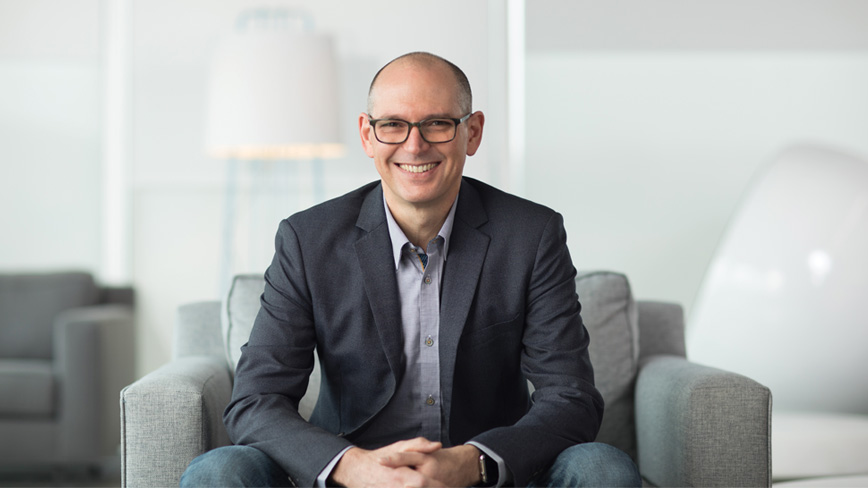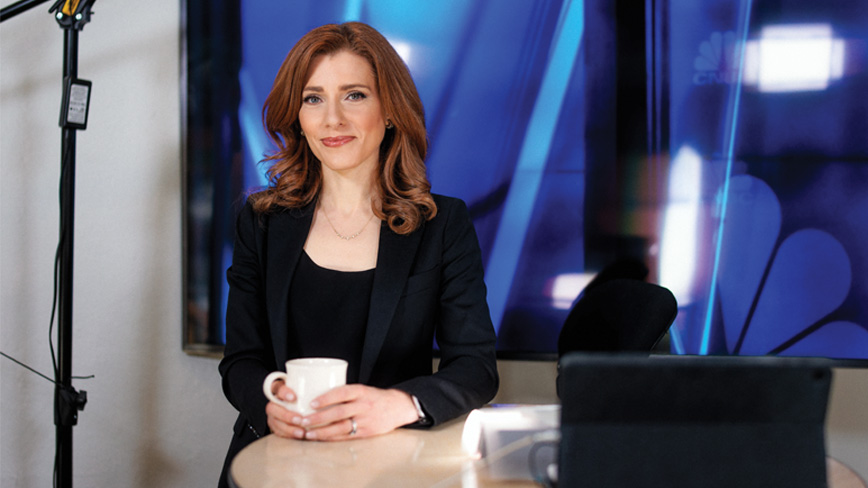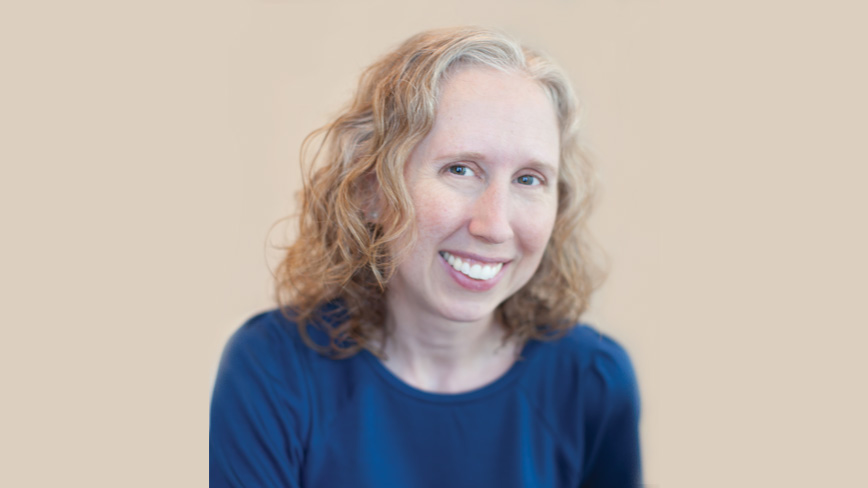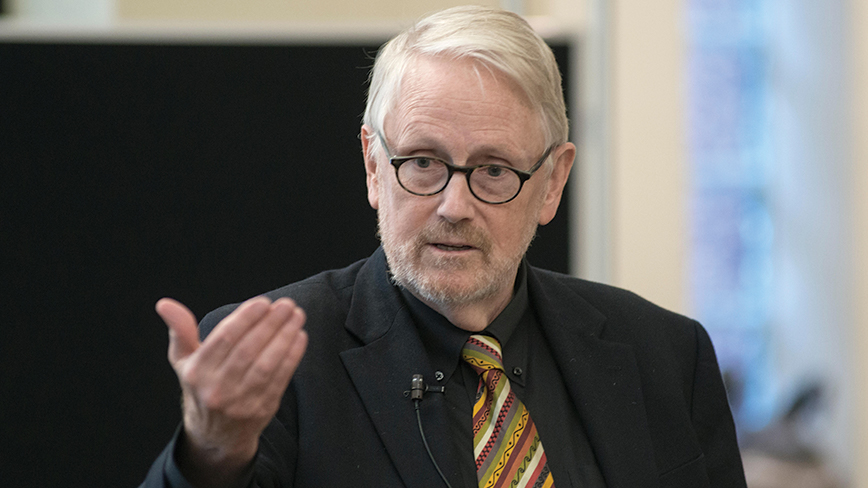
Kim Scott ’90 had an employee who was terrible at his job, but she was afraid to speak to him about his performance for fear of hurting his feelings. Plus, if he got upset, she worried the rest of her team would think she was a jerk.
So she danced around the man’s shortcomings, hoping her indirect comments would inspire improvements. But they didn’t, and eventually she fired him.
“It was a terrible moment in my career,” Scott said at a TEDx talk last year. “He looked me right in the eye, and he said, ‘Why didn’t you tell me? … I thought you all cared about me.’”
In that moment, Scott (who was known at Princeton by her maiden name of Malone) realized she’d failed horribly as a boss. That insight eventually spurred her to write the 2017 bestseller, Radical Candor, which has changed how the business world thinks about management.
The book — subtitle: Be a Kick-Ass Boss Without Losing Your Humanity — is a guide to boss-employee communication for the modern era. It has sold more than a million copies worldwide and has been translated into 20 languages. Many companies buy the book for new employees. Scott’s been asked to speak to countless groups, from leaders at West Point to an organization for hairdressers. Just this year, she was profiled in SAFETY4SEA, a publication focused on sustainable shipping, and she spoke at a Copenhagen conference for Scandinavian businesses.
Scott’s insights are in such demand that when the book came out in 2017, she launched a consulting and education business, also called Radical Candor, which has worked with over 200 organizations around the globe and has trained more than 200,000 executives and employees.
“The experience of having a bad boss is nearly universal,” Scott tells PAW. “There’s increasingly a realization that we need to articulate what managers do and how to do it better.”
The idea at the core of Radical Candor is straightforward: Employees need clear feedback so they can improve at their jobs. As such, bosses shouldn’t shy away from being direct, as Scott originally had. But, also, as anyone who’s coached a sports team (or watched Ted Lasso) knows, feedback is most effective when a person feels like the manager delivering it genuinely cares about them.
For many, being direct hasn’t been the problem. “There’s this notion in today’s world that either you’re a complete asshole and really successful, or you’re really nice but not really successful,” Scott says. “That’s a false dichotomy.”
“Competition to hire people is so intense. There’s an increasing understanding that people join companies but leave bad bosses.”
— Kim Scott ’90
Meanwhile, business schools haven’t traditionally provided much instruction on “soft” skills, focusing instead on finance, accounting, and marketing. “I took exactly zero classes in managing people,” Scott says.
Today, more companies are interested in training executives how to lead humanely. The balance of power between bosses and employees has shifted. In earlier eras, managers held workers’ careers in their hands. They could yell and abuse to their hearts’ content. Today, thanks to sites such as LinkedIn and Indeed, employees can more easily find new opportunities, and there’s less stigma about job-hopping.
“Competition to hire people is so intense,” Scott says. “There’s an increasing understanding that people join companies but leave bad bosses.”
When the pandemic hit, Scott thought she’d have to shut her business down because it almost exclusively involved in-person programming. But demand remained high, and when Radical Candor moved online, the company was able to expand its reach.
During the lockdown and its aftermath, Scott began addressing some of the phenomena now roiling the workplace, such as quiet quitting and the debate over work from home vs. return to office. But, she says, the principal driver of interest in her work has remained constant: “The core issue — how can we work together better — is what people are struggling with.”
Growing up in Memphis, Tennessee, management was the furthest thing from Scott’s mind. Novels were her first love. “They answer the question of how to live,” she says. “Why some people live joyfully and productively, and why other people are so miserable.” (She’s written three such books, including Virtual Love, which got a nod from Wired.)
In high school in the 1980s, Scott’s attention turned to the Cold War. She’d once heard an Air Force general say the United States needed enough nuclear weapons to “blow up the world four times,” she recalls. “I thought, ‘This seems irrational.’”
At Princeton, Scott worked on a project for Frank von Hippel, the storied physicist and professor of public and international affairs. The goal: Estimate the number of deaths that would result from a tactical nuclear war. “We got out our compasses to measure the blast radiuses around Russia and the United States,” she says, “It turns out everybody would die.”
Majoring in Slavic languages married Scott’s two interests. “I had this theory that [the Cold War] was one giant human misunderstanding between the Russians and Americans,” she says. She thought, “If I read the great American novels and the great Russian novels, I could figure it out.”
Scott’s thinking was always ambitious, says her roommate Caroline Reitz ’90. The two met the first day of freshman year. That evening, instead of heading out to parties, “We spent the whole night talking about infinity,” Reitz says. “Not in a pretentious way … . She just wanted to sit in a dorm room and talk about big ideas.”
By graduation, the Berlin Wall had fallen, and the Cold War was over. Scott headed to Moscow to do think-tank research on possible “swords-to-plowshares” conversions of Soviet military factories to civilian purposes. Then she got a job at a Moscow-based investment fund. After that, she was hired to launch a diamond-cutting factory, where she was tasked with recruiting Russian cutters.
Scott thought her American dollars would make for easy wooing. But her prospective hires were looking for more than cash. Russia was unstable in the ’90s, and the cutters mostly wanted to know whether Scott would ensure their families’ safety if things went off the rails. “They wanted a boss who gave a damn,” Scott says.
“All of a sudden, management became more interesting,” she says. Previously business had just seemed about money. Now she realized it was ultimately about human relationships. “I thought, ‘That is something I care about and I could be good at.’”
After four years overseas, Scott headed to Harvard for an MBA and then dove into the frothy late ’90s world of tech startups. Her work experiences in Russia hadn’t always been stellar, and her next jobs gave her more examples of substandard management.
At a telecom startup, the company’s founders needed to make cuts, but they were too scared to face their own employees and so they hired what Scott calls a “professional asshole” to do the dirty work. Afterward, Scott watched as the founders struggled to understand why the remaining employees no longer trusted them.
Next, at an online mortgage brokerage, Scott discovered the company’s founder was paying Scott’s male colleague about a third more than her simply because he had a wife and child, while Scott was still single.
Tired of working for jerks, Scott launched her own startup, Juice Software, which created spreadsheet collaboration tools. In part, she wanted to see if she could create the kind of ideal working environment that had so far eluded her. But then she ended up swinging too far to the other side — prioritizing being nice over being clear.
Scott talks about an “aha moment” that crystalized where she’d gone wrong. She had a dog she adored so much she “couldn’t bear saying a cross word to her.” One day during a walk, the dog kept trying to run into the street and almost got run over.
A man next to her on the sidewalk said, “I can tell you really love that dog, but you’re going to kill [it] if you don’t teach it to sit.” He then turned to the dog, pointed firmly at the sidewalk, and said, “Sit!” The dog promptly complied. (“I didn’t even know she knew how to do that,” Scott confesses.) The man turned to Scott. “It’s not mean,” he said. “It’s clear.”
Juice Software eventually folded, but Scott was soon recruited to Google to run the AdSense advertising program. There she discovered the culture she’d been seeking. Colleagues seemed to enjoy and respect each other. They trusted each other enough to hash out ideas with the vigor and directness required to produce the kind of innovation for which Google is famous.
Scott took another stab at fostering her dream culture. Within her own team, she encouraged candor and caring around things that weren’t going right. She created a “Whoops-a-Daisy” award that bestowed a plush daisy on whoever shared the biggest mess-up in any given week. In meetings with direct reports, she encouraged her employees to tell her what she should do to make it easier for them to work with her.
And when it came to debating ideas, Scott “enthusiastically and relentlessly farmed for dissent,” says Russ Laraway, who worked for Scott at Google and later wrote his own book, When They Win, You Win: Being a Great Manager Is Simpler Than You Think. “She really meant it when she said, ‘It doesn’t need to be my idea. We just have to get the best one.’”
Recently, when Laraway hired a former Google colleague into his current company, the woman told him everyone in her group had wanted to work with Scott’s team. “We were getting the straight scoop,” the woman said. “You treated us with respect. And we were heard by you guys.”
“That’s the culture Kim set,” Laraway says.
After Google, Scott moved to Apple to create a new curriculum for the company’s internal management program. It was an opportunity to share what she’d learned with a much bigger audience.
Later, the then-CEO of Twitter, a former Google colleague, asked Scott to design a class for his managers. Word got around, and soon other tech CEOs began asking for help as well. In 2015, a prominent venture capital firm asked Scott to speak at its annual conference. While white-boarding the presentation, Scott came up with the concepts for Radical Candor.
Brett Berson, a partner at that firm, First Round Capital, says Scott’s concepts have caught on in part because of her ability to make complicated ideas feel simple and accessible. “She created a framework and language to take something that’s very squishy, and she made it very tangible and easy to comprehend,” Berson says. Plus, Scott’s willingness to share her own stumbles and embarrassments makes her eminently relatable. “She’s a very good storyteller.”
Radical Candor remained on the New York Times and Wall Street Journal bestseller lists for years, and Scott is among the experts and celebrities who’ve been invited to create courses on MasterClass, the online education platform. Her ideas caught on so widely in tech that HBO’s Silicon Valley once lampooned them, and third-party retailers have even pirated her core sayings and plastered them onto posters and cellphone cases.
In 2021, Scott published a follow-up book, which she re-released this year under a revised title, Radical Respect: How to Work Together Better. It functions, she says, as a precursor to the first book by unpacking the behaviors and mindsets that undermine trust.
“It tries to tease apart bias, prejudice, and bullying,” Scott says, which destroy the possibility of effective collaboration and communication. “It’s a hard topic,” she says. Organizations often get defensive about even admitting these dynamics exist. Scott hopes Radical Respect’s roadmap will show leaders how to create healthier workplaces.
Reitz says Scott’s willingness to take on such a difficult topic is typical of her. “It’s like the infinity thing,” Reitz says. “She’s interested in the harder parts of the conversation.”
“She could have just ridden the Radical Candor thing out,” Reitz continues. “But she tried to use some of the capital [she’d built] to fight a harder fight.”
Chris Hyams ’89
‘Thinking About What “Talent” Actually Means’
Indeed is the largest job-search website in the world. Chris Hyams ’89, who became its CEO five years ago, sees the platform as a giant opportunity to influence how hiring gets done — especially in removing systemic biases.
Initially that meant encouraging employers to reconsider the ubiquitous requirement for college degrees and adding features to the platform to make it easier for applicants who’d been incarcerated to find work.
“I’m on the front lines, every single minute of every single day, thinking about what ‘talent’ actually means and what makes people capable of being successful,” Hyams says.
Indeed itself dropped the college requirement in all roles, except those where it was functionally necessary, like on the legal team. “We immediately saw more people applying, and we immediately had more success in hiring people,” Hyams says. The company also partners with outside organizations to help job hunters expunge incarceration records, and it awards a “Fair Chance” designation to companies open to hiring people who’ve been through the justice system.
Over the past year, however, the company’s focus has turned to the dramatic impact AI is having both on the nature of work and on how algorithms will impact hiring in the future. In a report released last year, Indeed found that about one-fifth of jobs could be replaced as a result of AI.
“It was very clear to me when we published that that nearly every single job will change considerably in the coming years,” Hyams says. “A year later, I now believe that nearly every single job will change in the next year.”
Meanwhile, Indeed is diving deeply into how bias in algorithms could affect hiring itself. “AI is powered by data, data comes from humans, and humans are flawed,” Hyams wrote in Fortune last year.
The company created a “Responsible AI” team with a mission to ensure its systems and tools can anticipate and eradicate biases. “To build truly responsible AI systems, we need to fundamentally change the way we build them,” Hyams wrote, observing how programming teams at tech companies often lack diversity.
One of the first things Hyams noticed when he arrived at Princeton in the fall of 1985 was the extraordinary wealth and privilege on campus. He could see how being an alumnus would later grant him instant credibility. “The Princeton name, because it’s on my résumé and my LinkedIn, creates an opportunity for us that very few other people get,” he says.
After college, Hyams returned to his hometown of Los Angeles to work in the chemical dependency unit of an adolescent psychiatric hospital. Later, he followed his then-girlfriend, now wife (Lize Burr ’86), to Vermont, where he taught special education in a rural high school.
“I spent a lot of time working with individuals who had been, and people whose families had been, incarcerated — some for very long periods of time. [They] had extraordinary talent and skills, but because of [their records], they had the exact opposite of what we get with a Princeton degree,” he says.
Hyams fell into tech by chance. In the 1990s, Burr was hired as an academic librarian at Rice University, which allowed spouses to take classes for free. “I found out that I really loved [programming],” he says. “It’s how my brain works.”
The tech world often talks about rooting out inefficiencies. Hyams has a more expansive view of what that means. “We’re a marketplace,” he says of Indeed. “We help people get jobs. But an efficient marketplace has to understand what the inefficiencies are, and a huge amount of those are these very long-held biases.”
Julia Boorstin ’00
‘All Companies Will Gain’ as They Learn From Women Leaders
Julia Boorstin ’00 went from Princeton straight into business reporting — first at Fortune, then at CNBC. It didn’t take long for her to notice that the executive ranks at many companies were overwhelmingly male. Or that the business world’s ideas of what a good leader looked like tended to be limited to a narrow set of behaviors strongly associated with men.
“Fortune magazine chronicled, and continues to chronicle, the most important people in business, and I saw very clearly that they were almost all men,” she says.
In the mid-2010s, however, things began to shift. More women rose to the C-suite and a critical mass of others started founding companies. At the same time, Boorstin had her first child and discovered that instead of slowing down, being a working mother made her better at her job. Fewer things distracted her, and she was more effective at addressing priorities.
In 2020, Boorstin decided to write a book about the powerhouse women she was encountering. One of her most compelling discoveries is that some of the qualities most associated with women — and least associated with business — like vulnerability, empathy, and gratitude — are among the qualities driving these leaders’ impressive results.
“I’m so struck by how different their approaches were,” Boorstin says, “and how they were able to harness all of these skills that have never been associated with power or success.”
“We’re a marketplace. We help people get jobs. But an efficient marketplace has to understand what the inefficiencies are, and a huge amount of those are these very long-held biases.”
— Chris Hyams ’89, Indeed CEO
When Women Lead: What They Achieve, Why They Succeed, and How We Can Learn From Them came out in 2022 (with a paperback update earlier this year). Boorstin has been hopping on podcasts and TV shows and crisscrossing the country ever since to speak to companies and organizations about what she learned.
“Companies are very anxious to retain their female talent,” Boorstin explains. In research on women in the workplace, McKinsey & Co. and LeanIn.org identified a phenomenon they call “the great breakup,” in which an unprecedented number of senior women are walking out the door, ditching microaggressions and the lack of supportive policies, in search of more amenable working environments.
“If you lose women at the senior levels, it’s going to have massive negative ripple effects throughout your company,” Boorstin says. “You’ll lose women who are impacting the culture around things like parental leave and pay equity,” she explains, which in turn undermines the organization’s ability to recruit younger women — and men.
As a teen, Boorstin’s mother told her she’d enter a world where women could do anything. At Princeton, where she majored in history and studied writing with John McPhee ’53, Boorstin didn’t feel women were treated differently. But the minute she stepped into the halls of Fortune, the inequity was obvious: The higher the ranks, the fewer the women.
When Women Lead isn’t just for women, Boorstin says. “I want men to understand the financial opportunity in investing in women and promoting women,” she says. There’s still a long way to go, of course. Only 10% of Fortune 500 CEOs are female, and female startup founders only receive about 3% of venture funding.
But the book ends on an optimistic note. Dollar for dollar, women-led companies frequently produce better results than male-led organizations. Research has shown that women are more likely to possess qualities associated with great leadership, including an emphasis on collaboration and relationship-building and a preference for data-driven decision-making. This year, Boorstin launched CNBC’s first-ever “Changemakers” list, featuring 50 women leaders driving change in their industries and challenging established practices.
“My hope for this book was to help change the narrative of what it means to be an effective leader,” Boorstin wrote in her epilogue. “The more women’s leadership models — communal, empathetic, and purpose-driven — become part of the established canon, the more all companies will gain.”
Lori Mihalich-Levin ’01
Making Support for New Parents Expected of Employers
After the birth of her second child in 2013, attorney Lori Mihalich-Levin ’01 went looking for resources on how to manage the transition back to work. All she found were articles on how women should downplay their new status (“Hide your baby pictures!”) or how to handle minor emergencies (“Prevent leaks!”).
“I found nothing helpful,” Mihalich-Levin says.
So she built a course to educate new mothers on everything — negotiating for flexibility at work, planning logistics, and embracing the inevitable surge of new emotions. “I created this whole program out of sheer desperation,” says Mihalich-Levin, who also operates her own health-care-related legal practice.
Mindful Return started as a blog and has grown in the decade since into a vibrant business. It now offers online courses for fathers as well as mothers and provides a series of trainings that companies can give to their employees on everything from work-life integration to maintaining career ambitions. There’s also instruction for managers on how to support employees who take parental leave, courses in Spanish and Portuguese, and chapters in the United Kingdom, South Africa, and India.
Mihalich-Levin says the working world has dramatically shifted its thinking around these issues. “There was a time when I was talking to employers when I had to explain what ‘parental leave support’ meant,” she says. “Now, there are a lot of family-related offerings, whether it’s parental-leave coaching or milk-shipping services … . It’s almost become expected that employers offer something to support their new parents.”
Many companies now understand that this approach makes them attractive employers. “The average number of U.S. women who return to work after maternity leave is 64%,” Mihalich-Levin explains. Among Mindful Return clients, 85% return to their jobs and 93% stay in the workplace altogether, says Mihalich-Levin.
Mihalich-Levin’s interest in empowering women dates to her Princeton years when she wrote her thesis on immigrant women in France and domestic abuse. While working at a trade association, she founded a working parent affinity group, and then she created another when she moved to a law firm.
Today, in addition to Mindful Return, Mihalich-Levin runs a network of 350 such affinity groups at companies from a range of industries, including banks, nonprofits, sports associations, and law firms. The pandemic accelerated the growth of these groups after video conferencing lifted the curtain on home life and conversations about the need to support parents burst into the spotlight. “We saw that this was a problem, and we needed to begin talking among ourselves,” Mihalich-Levin says.
Bo Burlingham ’68
‘Looking for Something More From Business’
In 2003, Bo Burlingham ’68 wrote an article about the famous Ann Arbor, Michigan, deli Zingerman’s for Inc. magazine. “The Coolest Small Company in America” detailed how its founders had resisted the usual capitalist pull to grow ever larger, and instead they created a path to financial sustainability by staying small and true to their origins.
A publisher soon contacted Burlingham to ask if there were other such companies — ones that fought the impulse to grow bigger. The result was Small Giants: Companies That Choose to Be Great Instead of Big.
The book profiles companies like Clif Bar and Danny Meyer’s Union Square Hospitality Group (home of many favorite New York City restaurants, including Union Square Café and Gramercy Tavern) — powerhouses that defied the usual imperative to shoot for unicorn status.
“What ties them all together is that they’re people who are looking for something more from business than just a means to create wealth,” Burlingham says. These companies have special relationships with their customers, their employees, and their communities that would be sacrificed if they prioritized growth.
The idea has had lasting power. In 2009, Burlingham and a co-founder created the Small Giants Community, which now teaches executives nationwide how to think and act like “small giants.” An annual summit attracts about 600 leaders, and a leadership academy trains executives.
Those who knew Burlingham at Princeton might be surprised to learn he found a career helping businesses. In college, he protested the Vietnam War, and after school, when he first became a freelance journalist, he penned ultra-liberal Mother Jones’ first cover story.
But marriage and the arrival of a family forced Burlingham to “get a real job,” as he puts it. He landed a writing gig at Fidelity Investments, which opened his mind to business. “I began to understand why it was worthwhile,” he says. “It was actually performing a service for a lot of people who needed help. They weren’t exploiting those people.”
Burlingham next joined Inc. and fell in love with entrepreneurs. “They’re some of the most idealistic people you can find,” he says. Burlingham eventually became the magazine’s executive editor before leaving to write business books. The Small Giants Community emerged after a health-care entrepreneur convinced Burlingham there needed to be a place where people building these organizations could meet and learn from each other.
Not all the businesses profiled in Small Giants survived. A 10th anniversary edition of the book includes a new chapter on how and why these companies sometimes fail. As with any organization, Burlingham wrote, taking your eye off your company’s finances, losing trust within your organization, and other such missteps can lead to a crash.
Meanwhile, the community continues to thrive. “It’s turned out to be more popular than I ever imagined.”










No responses yet